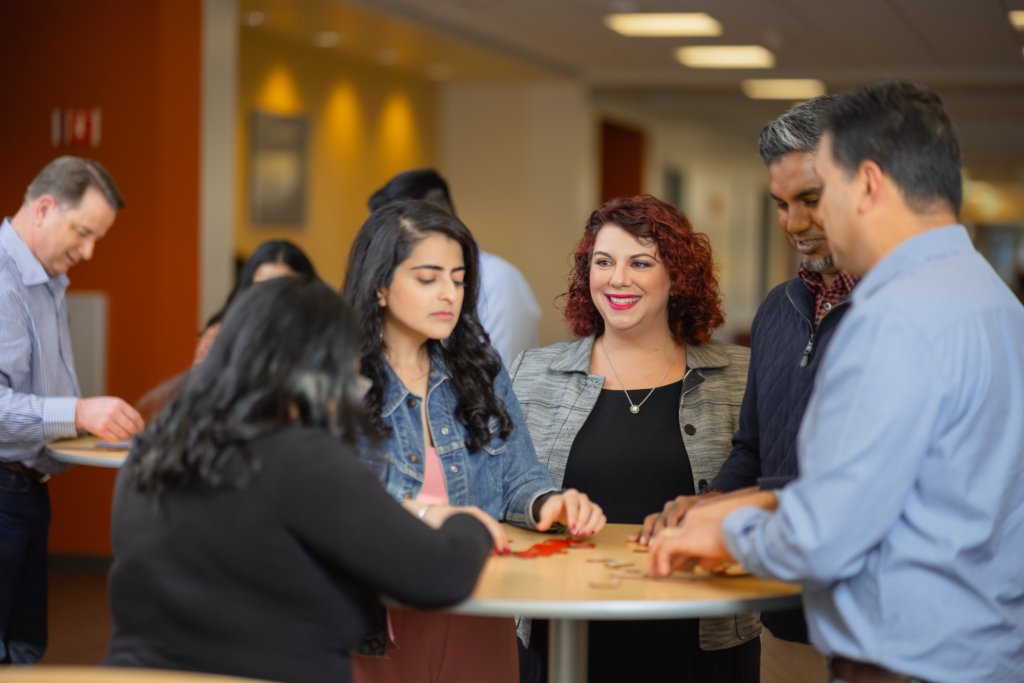
Santa Clara University Leavey School of Business EMBA students work on a team exercise during a recent class. Courtesy photo
Oksana Komarova’s professional interest in business and healthcare has led to a varied career. She worked as a benchside lab tech at Oregon Health & Science University and managed P&L for Louis Vuitton’s retail businesses in three international markets. She led business development for a communication agency in New York City and worked at an ophthalmology gene therapy startup.
In 2015, she moved to the Bay Area and pivoted fully back into healthcare, this time with a focus in biotech. “I wanted to be where drug development decision-making and value creation happens, and where I could bring the breadth of my experience and unique skill set to the table,” says Komarova, EMBA ‘24, now the Lymphoma Launch Lead, U.S. Marketing for Genentech.
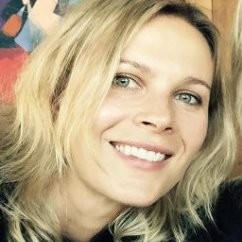
Oksana Komarova
When she decided to return to the classroom for more formal, focused leadership training, she centered her program search on the Bay Area. She certainly had a lot of choices: Within commuting distance, UC-Berkeley Haas School of Business and The Wharton School in San Francisco both have top ranked Executive MBA programs. Stanford Graduate School of Business offers a range of leadership and general management programs for mid-career professionals.
And, there’s Santa Clara University’s Leavey School of Business, sometimes referred to as the valley’s hidden gem.
“SCU EMBA’s curriculum is thoughtfully put together, faculty and administration support are fantastic and the price tag is very competitive,” Komarova tells Poets&Quants.
“The intangibles that enhance learning and enrich the grad school experience are also a differentiator: experiential learning, open-minded, collaborative yet competitive culture, and diverse student and faculty body.”
THE OTHER SILICON VALLEY EMBA
Living most of her life outside of the Bay Area, Komarova has come to appreciate the valley’s design-thinking inspired experiential, iterative approach to learning and working. The executive MBA at SCU Leavey – and its vaulted location – feels almost tailor made for executives like Komarova.
“The program is located in the global tech capital, the world’s premier biotech hub, and an area that is home to many successful innovators, scholars and entrepreneurs. Many SCU EMBA faculty have successful careers that span both academia and the applied world. For example, my Financial Accounting professor this term is also a CFO at an established, high-growth tech company and is a serial entrepreneur.
“The value-add of Silicon Valley for me personally is two-pronged: I get to learn more about entrepreneurship and healthtech,” she says. “Being in Silicon Valley helps understanding where AI is heading, where the opportunities versus pain points meet with healthtech and therapeutics discovery, development and commercialization, and how the VC and startup world works.”
SCU LEAVEY EMBA SPOTLIGHT
SCU Leavey ranked 34th in Poets&Quants’ 2022 composite EMBA ranking. Our composite ranking is based on U.S. schools’ performance in the three major EMBA rankings – U.S. News & World Report, the Financial Times, and The Economist – and schools that don’t participate in all three are penalized by our methodology. Leavey was ranked 13th in U.S. News’ ranking and did not participate in the Financial Times’ or the latest Economist ranking.
Students in its 20-month program largely advance through the curriculum as a cohort, though they do have some electives they take with students from other MBA programs. This week, Poets&Quants For Execs is looking into Leavey’s Executive MBA Program as part of our EMBA Spotlight series. Our conversation with faculty director Jo-Ellen Pozner, presented below, has been edited for length and clarity.
You have taught in the Leavey EMBA program since 2019 and took over as faculty director in 2022. Tell me why you wanted to take the leap into leadership.
Our students are amazing, and what I love about this program and why I agreed to step into that leadership role is that they are thirsty for knowledge. They're really excited to be engaged in not just the classroom, but everything we do. It's a much more immersive experience than our other MBA programs, and I really get a lot of gratification out of the fact that they're able to put their new skills that they learned in the classroom to use immediately.
We get immediate feedback, too. Students tell us if something worked, if something is helping, or changes that they’ve made. There's nothing like that.
What is the size of the 2023 cohort?
Our current cohort is 15, which is a little bit small, but we've been averaging between 20 and 30 most years.
Any thoughts on why this cohort is a bit lower? Is it a remnant of the pandemic?
It's unclear. You know, I've been watching MBA programs for the past 25 years since I started my MBA program. Traditional MBAs are more counter cyclical: When the job market is not doing well or the economy's not doing well, it's a great time to invest in skills and take little time off. The EMBA is a little bit different, and I think it might be more cyclical than counter cyclical.
Has Leavey experimented or talked about alternative formatting or delivery? Online, hybrid, or what have you?
We haven't really done that very seriously because what we hear over and over again is that our students really value the in-person experience. There are some workshops, speakers or weekday events that happen virtually, but part of the reason that our student body is interested in our program is because they really want to make connections, meet people face-to-face, and forge those really deep relationships. That's only done in person.
What sets the SCU Leavey EMBA apart?
I think our biggest advantage is our location right in the heart of Silicon Valley. It means that our program is designed for executives within the Silicon Valley ecosystem and really for them specifically. It’s not just for folks involved in tech, but folks around tech. About half of our students work in the tech sector, and about half of them have undergraduate degrees in engineering as opposed to only about 20% in business. So these are folks with really deep technical skills and experience in a range of tech domains.
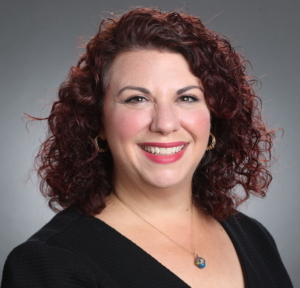
Faculty Director Jo-Ellen Pozner
We kind of talk about tech as if it's a thing, but it's actually dozens of different industries that are suffused with high tech. So that range of domain experience and deep technical expertise brings not just experience and knowledge, but also connections, social networks, and skills that enrich the classroom experience for everybody.
Our location also means that we have exposure and access to a really impressive range of instructors. The majority of our classroom instructors are Santa Clara faculty, and it's really our top teaching faculty who are experts in their subject domains and fantastic instructors that are in the EMBA classroom. It's really a prized assignment.
We also have access to professional instructors from the valley, guest speakers and alumni networks. All of those connections bring networking opportunities that add to the overall to our EMBA experience.
I want to note that not all of our students are in tech. We have a lot of folks who are in things like real estate, professional services, food and hospitality, family business, and their own entrepreneurial ventures. Those non tech executives in this ecosystem need to work with tech folks and tech folks need to work with non tech executives. That balance, I think, really brings a lot not just to the social and learning environment, but also a functional area of expertise: How do you deal with people who are in a very different business domain or business function from you?
Can you elaborate on some of the guest speakers you are able to invite in because of your proximity to the valley?
We have what we call a Luminary Speaker Series in which we bring in C-level executives from mostly tech but often other domains as well. Our most recent speaker was an entrepreneur who has a medical background in the biotech area, and he talked about his training and how that led to a career in entrepreneurship and in the startup domain. It was a fascinating journey.
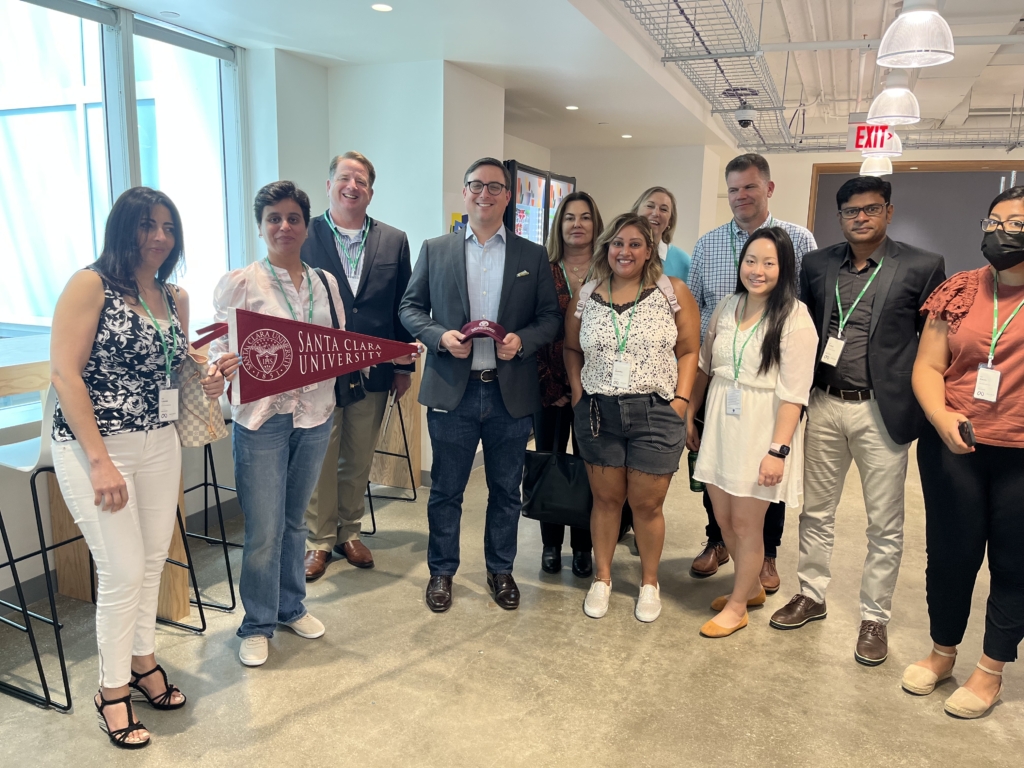
Executive MBA students from Santa Clara University's Leavey School of Business visit Meta's Washington, D.C., office during an immersion residency in the Capital. Courtesy Photo
Silicon Valley is certainly at the epicenter of news that is having broader implications on the economy. For example, the collapse of Silicon Valley Bank happened right in your backyard. How do professors bring these kinds of events into the classroom?
Certainly these kinds of current events are talked about in the classroom. All of us also have connections to Silicon Valley Bank, whether it's through students or friends or our professional network. It’s certainly a topic of conversation.
It's also part of the broader conversation about the transformation that Silicon Valley is currently going through. I think a lot of the focus of business reporting over the last couple of months, that kind of doomsday reporting, has been about layoffs in Silicon Valley. That's a really salient thing for many of our students and for all of us who live and work here. I think what it suggests is that technical skills and vision are no longer sufficient to be really successful. That, again, is actually a point of differentiation and advantage for our program.
The Silicon Valley leaders of tomorrow need deep personal skills, they need good cross-functional training and execution ability. They need an entrepreneurial mindset. Those are exactly the kinds of things that the Leavey EMBA program provides.
I think a big focus of our program is that we center on innovation, impactful leadership and developing that entrepreneurial mindset. Our curriculum has really been designed to balance standard business disciplines like marketing, accounting, finance, and strategy with immersive workshops and high-touch experiential learning in areas like ESG and sustainability, which again are the kinds of things that the leaders of tomorrow need to be paying attention to right now. Our location in Silicon Valley obviously gives us access to leaders in those fields, and helps us build connections with the larger university community.
For example, within the business school we have a Center for Food Innovation and Entrepreneurship which is a wonderful partner for us. We collaborate on programming, we've created one day consulting programs, and we do an immersive trip to study sustainable food business in wine country every year. Those kinds of things help give our students a broad view into the changing landscape as well as opportunities to flex their skills and to really develop the vision and mindset that they need to transcend the current disruption in the economy.
Speaking of immersions, what residencies does the Leavey EMBA offer?
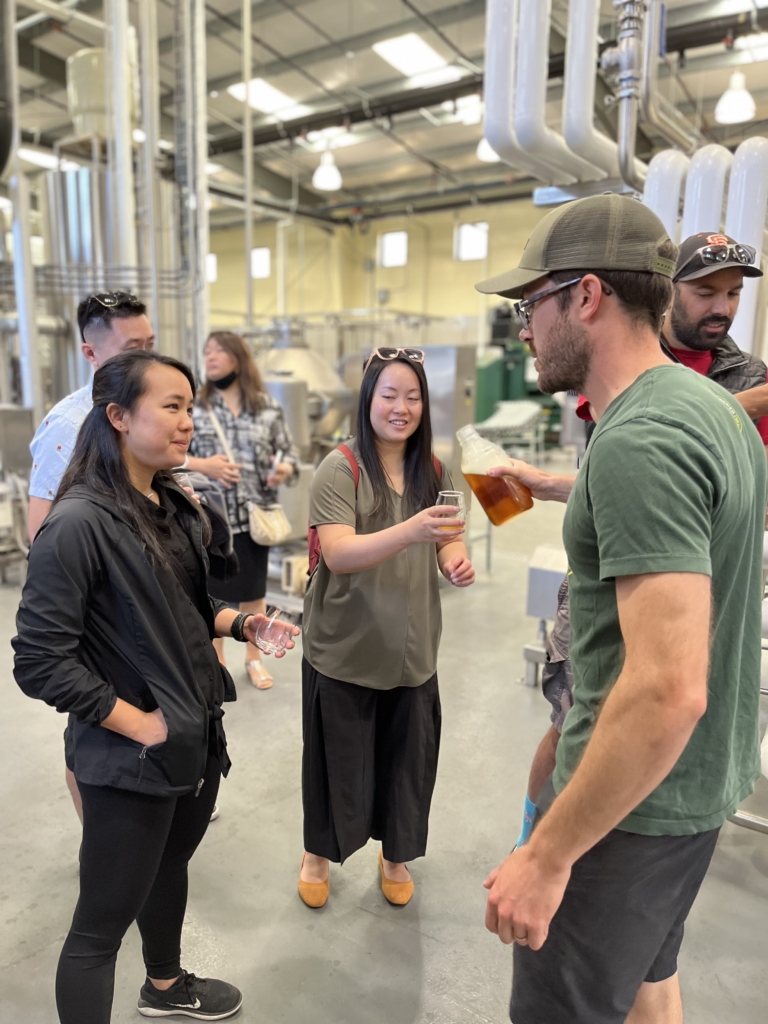
SCU Leavey EMBA students visit Seismic Brewery in Santa Rosa to talk about sustainability. Courtesy photo
We have two residences that are part of the formal curriculum that focus on leadership. One at the very beginning of our program and one at the end of the program. They're really bookends, and students spend three days each with Barry Posner who's a world renowned expert in leadership. Those are really wonderful experiences that kind of set the stage for the program and help students bond and create a cohesive cohort, and then to reflect on everything they've learned and help them develop plans for the future. So those are residential experiences near Monterey Bay.
We also do a day and a half in Santa Rosa and wine country where we focus on sustainability. And we just started last year a three-day trip to Washington DC where we focus on ESG issues.
Finally, this year after a couple of years of rest because of COVID, we are going back for an international immersion as well. We've partnered with Deggendorf Institute of Technology in Bavaria, Germany, and we're doing a one-week immersion to study a different kind of business ecosystem. The environment there has been super innovative over the course of centuries, but with a really different model than than we've seen in Silicon Valley.
What kind of student are you targeting?
One of the things that we focus on is having students that represent the community that we live in. Not just the kind of Silicon Valley tech community, but also the broader community in this area, and that leads to a really diverse student base. A quick tally of the last five years of students, we had 44% women, 50% South and East Asian students, 10% Black and Latino students. That's just reflective of the area that we're in.
It's really amazing that we're able to pull students and engage students from a pretty broad range of backgrounds, and I think that adds to the program because everybody brings their own perspective. We get much deeper, richer classroom experiences. A lot of what we learn in the EMBA classroom is about recombining elements that might be familiar to some of us, but not all of us. The more diversity we have, the more opinions, perspectives, ideas, and experiences that everybody brings, the more possibility there is to find novel solutions from other domains and the linking of new solutions and old problems.
Any program milestones or recent innovations that you'd like to highlight?
We are celebrating our centennial this year at the Leavey School of Business and our 25th cohort of EMBA students, so that's a big milestone. We're proud of that continuity. It was, I think, a scrappy program in the beginning and has really gotten its legs. We have a tremendously loyal alumni base from those early cohorts in particular who are excited about connecting with each other.
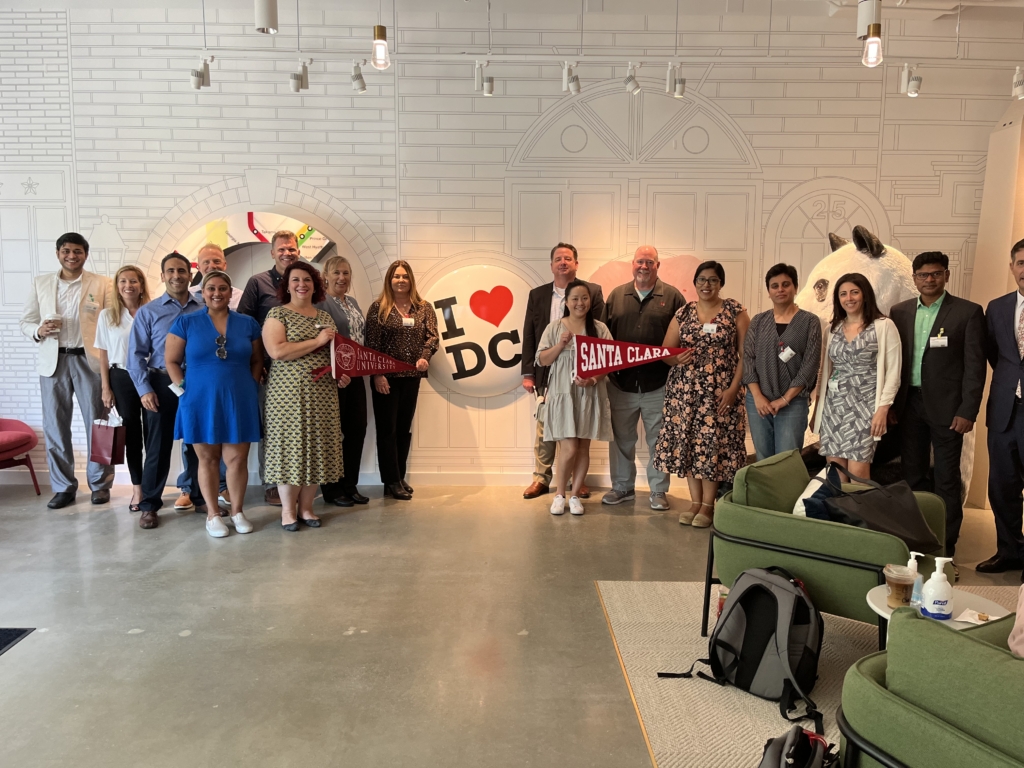
Leavey EMBA students visit Google's D.C. headquarters during a residency. Courtesy photo
We also over the last couple of years have added a lot of what we would call co-curricular experiences: Workshops ,discussions that complement what we're doing in the classroom, etc. For example, we have a strategy execution class that is accompanied by an M&A workshop that's actually taught by EMBA alumni. We have an EMBA alumnus who teaches a workshop on how to run a board meeting for a private company that complements the class on corporate innovation and corporate entrepreneurship. And again, it's partially because of our connections in Silicon Valley and the folks that are in our network.
What are some of the trends you are watching closely in terms of the EMBA degree?
One of the things that is really important to us as a program and as a university is that we are infused with Jesuit values. I think that allows us to kind of stay a little bit above the fray of trends in the EMBA world because what we're interested in is staying true to the ideals that the university was founded on. Although they are religious values, they play out in very meaningful ways for business. So, Jesuit values like serving others, engaging in deep reflection, working with empathy and compassion, contributing to the greater good, those aren't just kind of buzzwords or ideas that came along because ESG is now something that many schools and businesses are paying attention to. Those have really been part of our DNA from the very beginning.
We obviously have an ethics class just like most programs would, but even more than that, those ideals are really inculcated into every aspect of our curriculum. We're trying to develop empathetic leaders who are in business, not just to do good business, but to make good decisions for lots of stakeholders. It's something that we have always been dedicated to and are constantly doubling down on.
Any plans for growth or other changes coming in the years ahead?
We would love to have slightly larger cohorts over the next couple of years. Our target is to have 30 to 40 students a year, and there's so much talent here. We've also started attracting people from outside the area as well. We actually have a student commuting from Japan, and that is an exciting development.
Do you have any insight into why you might be attracting more people from outside the area?
I think that our reputation locally has grown dramatically over the last several years and that has kind of pushed out to national and international recognition. We've actually always, as a university, attracted a lot of folks from the Pacific Rim and have a high profile reputation there, but a couple of years ago, we moved from the regional rankings as an undergrad university to a national ranking. I think people are starting to take note.
On top of that, I think our students do really good work. I always tell our EMBA students that they are our best ambassadors. They're our best advertisers. They connect with people from other local universities, obviously, from the tech companies that they're working with, and I think word of mouth has done a tremendous job for us.
Anything else you’d like readers to know?
I just want to call attention to the Leavey PLUS initiative – Partnerships, Leadership, Unifying Purpose, and Sustainability. Dean Grier has led a really tremendous effort at strategic planning that I think is going to be quite exciting. The EMBA program already aligns really nicely with those areas of investment, so I can see us being really plugged into the big picture and high plans that the school is developing.
And finally, you know, I started teaching this program five years ago. First, the Leading Teams and Organizations class and then we added negotiations to the curriculum. I loved teaching for the reasons that I mentioned earlier, but as I've gotten more deeply involved in the administration of this program, I have developed a whole new appreciation for our students. They are wonderful people to a person. They all bring something interesting, fun, and they care deeply about each other. They're giving up a lot to be here. Almost everybody has a family. Everybody has something else they could be doing on the weekend. And these folks really enjoy spending time with each other and the culture of our cohorts. Each one is different, but they're all special and I enjoy spending time with every one of them. So that's kind of an added benefit. I didn't necessarily anticipate.
DON’T MISS THESE STORIES IN OUR EMBA SPOTLIGHT SERIES:





Questions about this article? Email us or leave a comment below.